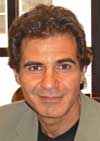 One year ago, the editors of AACC's peer-reviewed journal, Clinical Chemistry, launched an ambitious initiative, the Clinical Chemistry Trainee Council, to help laboratorians-in-the-making advance their education and gain a foothold in the profession. This unique online resource offers free access to case studies, Clinical Chemistry's Guide to Scientific Writing, webcasts, online discussions, and much more to lab medicine residents and fellows world-wide. On the occasion of the Trainee Council's first anniversary, CLN spoke with Clinical Chemistry's Editor-in-Chief, Nader Rifai, PhD, about the program's development and plans for the future.
One year ago, the editors of AACC's peer-reviewed journal, Clinical Chemistry, launched an ambitious initiative, the Clinical Chemistry Trainee Council, to help laboratorians-in-the-making advance their education and gain a foothold in the profession. This unique online resource offers free access to case studies, Clinical Chemistry's Guide to Scientific Writing, webcasts, online discussions, and much more to lab medicine residents and fellows world-wide. On the occasion of the Trainee Council's first anniversary, CLN spoke with Clinical Chemistry's Editor-in-Chief, Nader Rifai, PhD, about the program's development and plans for the future.
Why was the Trainee Council created?
It was created to reach young laboratory scientists to help them early on in their careers. The Council also introduced them to Clinical Chemistry, with the idea that when they start their professional lives, they will contribute to it. This initiative has evolved since then towards a comprehensive educational resource, not only for aspiring clinical chemists but also students in all disciplines of laboratory medicine. My goal is for it to be the leading source of education for laboratory medicine in the world.
Who can participate in the Trainee Council?
Any laboratory medicine student is eligible as long as he or she is still in training. We just streamlined the registration process, so all students have to do is go to the Council webpage, click on "Register Now," enter nine fields, and they're done. We just need to know their name, institution name, email address, country, their mentor's name and email address, the year they expect to complete training, and whether they are a trainee, mentor, or member of AACC's Society of Young Laboratorians. That's it. The entire process literally takes less than a minute.
What are some of the Trainee Council's features that you're most excited about?
It's an enormous resource. Pearls of Laboratory Medicine is a series of 10-to-15 minute audio slide presentations on key topics of interest to clinical chemists that we've broadened to include microbiology, transfusion medicine, and hematology, and are continuing to expand.
We have a library of case studies—more than 60—that have been published in Clinical Chemistry. These include key questions that students should consider about each topic.
Our Guide to Scientific Writing is a great help to students interested in pursuing research. It provides insight on structuring their writing and presenting their results in a way to improve the chances that their hard work will be accepted for publication.
Another feature that I especially like is CouncilChat. This is an online discussion board run by six junior faculty members from around the world. This is a way for a trainee in Senegal, for example, to talk with trainees in Indonesia, Belgium, or the U.S. It creates a camaraderie that doesn't exist elsewhere right now.
Trainee Council members also can access a new Clinical Chemistry feature, Quo Vadis?, which asks a question each month and invites all young AACC members and potential future leaders of our profession from around the world to answer it in 100 words or less. The question will be published in Clinical Chemistry, posted online, and via AACC's social media platforms.
These are just a few examples. We're building on this good foundation and plan to keep expanding our offerings.
The Trainee Council's Spanish language pages launched in March. Are you planning to make the content available in other languages?
Yes, definitely. We expect in July to launch the entire program with all its content in Chinese and by the end of this year in Russian. Next year we plan to offer full content in Japanese, Arabic, and Portuguese.
What features and content are planned for the future?
We want to help students take their certification exams, and we're doing that by building a bank of questions in various disciplines that will be helpful for those taking either American or British boards.
I also would like to make the Trainee Council a modular educational experience. Let's say you listen to one of our lectures on acid-base disturbances. You'll be connected with all the case studies we've published in Clinical Chemistry that have to do with that. If we have a review on that subject, you'll be connected with it. You'll also be linked with practice board exam questions involving acid-base disturbance. Down the road we'd like to take that a step further with evidence-based learning where students would take a quick quiz before they start this module and a post-test after they finish. This could evolve into a way for mentors to evaluate how well their trainees are learning. Right now the only way for us to know is whether or not the students pass their board exams. Furthermore, this would be a good way for accrediting bodies to quantitatively assess the success of a training program.
This is an enormous undertaking! How do you plan to sustain it?
Yes, it's very ambitious and it's free. That creates a particular burden on us to keep it alive and find resources, but I'm optimistic about doing so since this is such a worthwhile undertaking. We also have an active and energetic executive board that is not only guiding us but also rolling up its sleeves to help achieve our goals.
Visit the Clinical Chemistry Trainee Council online.